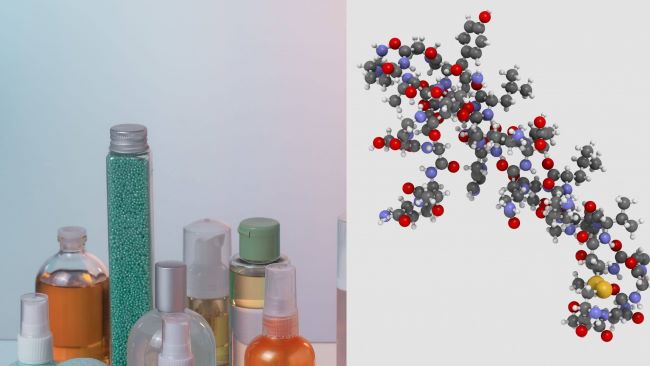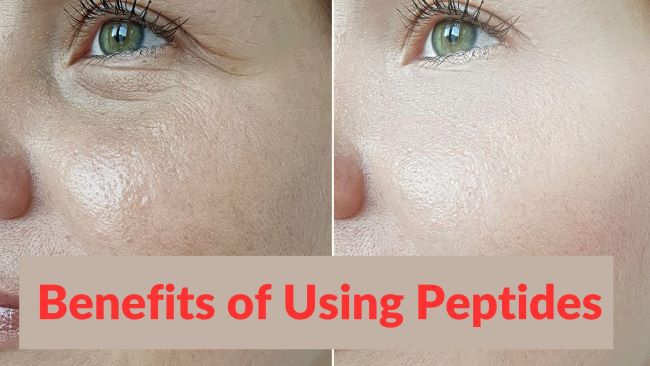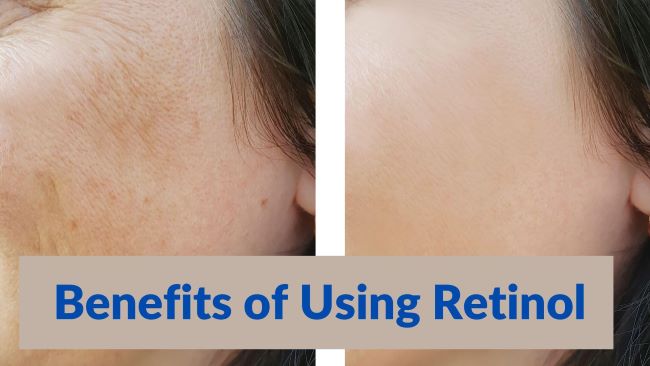Comparing peptides vs retinol is like comparing apples to oranges! Peptides are made up of a chain of amino acids that work to help build and repair the skin. Retinoids (such as retinol), on the other hand, are vitamin A derivatives that signal your skin cells to turn over faster. Both have their benefits when it comes to anti-aging.
But which one is best for you? In this article, we’ll compare peptides vs retinol so that you can decide which one – or both – should be part of your everyday regimen!
What Are Peptides and How Do They Work on the Skin

Peptides are small molecules that are made up of amino acids, the building blocks of proteins.
Peptides can be found naturally in your skin and are involved in a variety of important biological processes, such as cell growth and repair.
Peptides also act like messengers, telling your skin cells what to do.
Benefits of Peptide Use in Skincare

Peptides have been shown to have several anti-aging benefits.
Here are 10 benefits of peptides in skincare;
- Peptides can provide a number of skin care benefits such as reducing wrinkles and improving skin tone, texture, hydration, and overall appearance.
- They have antioxidant benefits that can help protect their skin from environmental damage without harsh treatments.
- They can stimulate cells to produce collagen and elastin, which are essential for youthful and healthy skin.
- Peptide-containing products may also reduce the appearance of dark spots, improve skin firmness, and combat the signs of aging.
- They can also be used to target specific areas such as sagging jowls, under-eye bags, and wrinkles around the mouth.
- Peptides provide a gentle alternative to more traditional treatments such as retinoids and chemical peels.
- Peptides are suitable for all skin types, as they are not known to cause irritation.
- They are versatile ingredients that can be used alone or in combination with other anti-aging ingredients for maximum results.
- They can also significantly reduce inflammation and redness
- Peptides have been proven to be a safe, effective, and in some cases, affordable way to reduce wrinkles and improve skin health without harsh chemical treatments or expensive spa treatments.
What is Retinol and How Does it Work on the Skin
Retinol is a form of vitamin A that works to improve the appearance of the skin by increasing cell turnover and exfoliating the skin.
In addition, retinol works by stimulating cells in the outer layer of the skin (the epidermis) to produce new collagen and elastin. These two proteins are essential for maintaining the structure of healthy skin and help to reduce the appearance of wrinkles and other signs of aging.
Retinol also works to regulate oil production in the skin, which can help prevent breakouts and blemishes.
Benefits of Retinol Use in Skincare

Retinol is one of the most widely used and well-researched ingredients proven to fight signs of aging.
Here are 7 benefits of retinol use in skincare:
- Retinol can reduce wrinkles, fine lines, and uneven skin tone.
- It can even help to lighten age spots and other hyperpigmentation.
- Retinol stimulates collagen production in the skin which helps to firm up loose or sagging skin.
- It boosts cell turnover which aids in healing wounds faster, as well as improving overall skin health.
- It also helps to reduce acne, blemishes, and blackheads.
- It helps to even out skin texture and can help clear up clogged pores.
- Retinol reduces inflammation and redness in the skin.
Comparing Peptides vs Retinol for Anti-aging – Pros & Cons

Let’s compare 9 pros and cons of peptides vs retinol for anti-aging.
1) Which gives a faster result?
Retinol known as the go-to anti-aging ingredient can take up to 6 months to see the anti-aging benefits. This is different when using retinol for acne which takes about 4 -12 weeks to see results.
Peptides, on the other hand, have more immediate anti-aging benefits and you can usually start to see noticeable results within the first 2 – 3 weeks.
2) Which requires long-term commitment?
However, retinol is known for its long-term benefits and is a great way to maintain your skin’s youthful look.
Peptides don’t require a long commitment as retinol does – you can start seeing results faster and you won’t have to worry about any negative side effects.
3) Which increases photosensitivity?
Another difference between the two is that retinol can increase photosensitivity in your skin, making it more susceptible to sun damage.
Peptides do not cause any photo-sensitivity, so they are a better option if you’re looking for an ingredient that won’t leave your skin vulnerable to sun damage.
4) Which is more gentle and better for sensitive skin?
The downside is retinol can be harsh on the skin and cause irritation. Peptides, on the other hand, are known for being gentle yet effective. This makes peptides more suitable for people with sensitive skin.
5) Which is more moisturizing?
Peptides are more moisturizing than retinol. This makes peptides a better choice if you have dry skin.
6) Which is more likely to cause skin purging?
Finally, Retinol can cause skin purging (flaking and irritation) for about 2 to 6 weeks as the skin adjusts, after which it takes a few more weeks to months for results to be seen. whereas peptides are more gentle and are less associated with such an adjustment period (skin purging).
7) Which is better for long-term use?
Topical retinol is safe for long-term use and produces long-lasting results, but it may be associated with a weakened skin barrier. Peptides do not weaken the skin barrier and also produce a long-lasting result, making them a better option for long-term use.
8) Which is ideal for daily use?
Retinol is a powerhouse when it comes to anti-aging and can be used daily, but if you have sensitive skin or are unsure how your skin will react, it is best to start slow and work your way up from alternate days.
Peptides, on the other hand, are gentle yet effective and can be used daily without any worries. Additionally, they won’t weaken the skin barrier over long-term use, making them the ideal choice for daily use if you’re looking for long-lasting results.
9) Which is better for acne and redness?
Both retinol and peptides can help improve acne, but retinol is more effective as it helps to reduce excess oil production and regulate sebum levels in the skin. Additionally, retinol’s anti-inflammatory effects help to reduce redness associated with acne.
Peptides can also help to mitigate redness and inflammation associated with acne as they are more moisturizing and helps to soothe the skin.
As an amazon associate, I earn from qualifying purchases. Full disclosure…
Tips for Using Peptides & Retinoids Together to Maximize Results
Using peptides and retinoids together can be a great way to maximize the benefits of both ingredients.
When formulated in different products, you can create a dynamic duo if you alternate between using peptides one day and then retinoids the next – this can help to give your skin the nourishment and protection it needs without overworking it.
However, there are some products that contain both retinol and peptides together in the same product. When used together, these dual-action formulas can help to boost collagen production and give your skin a more youthful look.
It is also important to select products that are specially formulated for use together – this will ensure that you get all of the benefits of both peptides and retinoids without any irritation or damage to your skin.
Finally, remember to always use sunscreen when using these two ingredients – retinol increases photosensitivity in your skin, so it is important that you protect it from UV rays.
Final Thoughts on Peptides Vs Retinol for Anti-Aging Skincare

No matter which ingredient you choose, it’s important to remember that consistency is key. Regularly using either peptides or retinol can help you achieve the desired effect and maintain healthy, youthful skin in the long run.
As with any skincare regimen, it is important to pay attention to your skin’s reaction when using either ingredient. If you experience any irritation or redness, step back and consult a dermatologist or skincare professional.
Both peptides and retinol are great active ingredients that provide different benefits to your skin. When used together, they can help you get the most out of your anti-aging skincare routine and give you glowing skin in the long run – whichever ingredient you choose, make sure to use it consistently and in the right way to get the best results. Good luck!
Thank you for reading this article. We hope it has been helpful in providing you with the information you need as you search for your perfect skincare routine – feel free to leave a comment below to let us know which one you plan to use in your skincare routine and why! We’d love to hear from you. Happy shopping!
